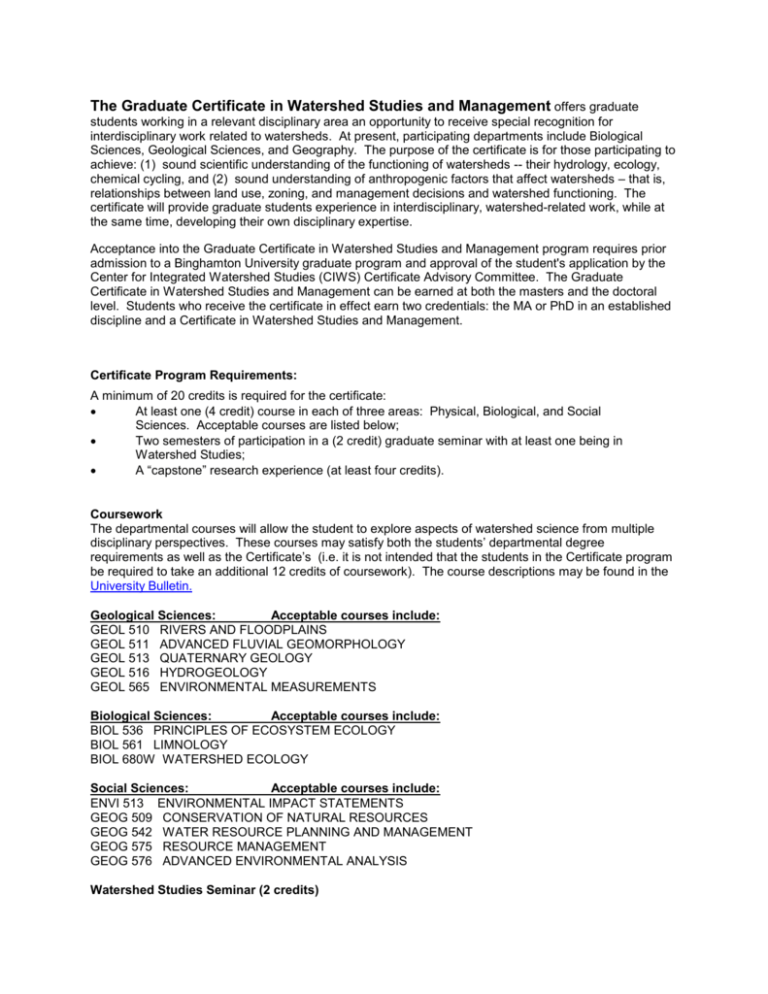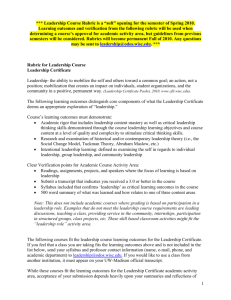Graduate Certificate in Watershed Studies and
advertisement

The Graduate Certificate in Watershed Studies and Management offers graduate students working in a relevant disciplinary area an opportunity to receive special recognition for interdisciplinary work related to watersheds. At present, participating departments include Biological Sciences, Geological Sciences, and Geography. The purpose of the certificate is for those participating to achieve: (1) sound scientific understanding of the functioning of watersheds -- their hydrology, ecology, chemical cycling, and (2) sound understanding of anthropogenic factors that affect watersheds – that is, relationships between land use, zoning, and management decisions and watershed functioning. The certificate will provide graduate students experience in interdisciplinary, watershed-related work, while at the same time, developing their own disciplinary expertise. Acceptance into the Graduate Certificate in Watershed Studies and Management program requires prior admission to a Binghamton University graduate program and approval of the student's application by the Center for Integrated Watershed Studies (CIWS) Certificate Advisory Committee. The Graduate Certificate in Watershed Studies and Management can be earned at both the masters and the doctoral level. Students who receive the certificate in effect earn two credentials: the MA or PhD in an established discipline and a Certificate in Watershed Studies and Management. Certificate Program Requirements: A minimum of 20 credits is required for the certificate: At least one (4 credit) course in each of three areas: Physical, Biological, and Social Sciences. Acceptable courses are listed below; Two semesters of participation in a (2 credit) graduate seminar with at least one being in Watershed Studies; A “capstone” research experience (at least four credits). Coursework The departmental courses will allow the student to explore aspects of watershed science from multiple disciplinary perspectives. These courses may satisfy both the students’ departmental degree requirements as well as the Certificate’s (i.e. it is not intended that the students in the Certificate program be required to take an additional 12 credits of coursework). The course descriptions may be found in the University Bulletin. Geological Sciences: Acceptable courses include: GEOL 510 RIVERS AND FLOODPLAINS GEOL 511 ADVANCED FLUVIAL GEOMORPHOLOGY GEOL 513 QUATERNARY GEOLOGY GEOL 516 HYDROGEOLOGY GEOL 565 ENVIRONMENTAL MEASUREMENTS Biological Sciences: Acceptable courses include: BIOL 536 PRINCIPLES OF ECOSYSTEM ECOLOGY BIOL 561 LIMNOLOGY BIOL 680W WATERSHED ECOLOGY Social Sciences: Acceptable courses include: ENVI 513 ENVIRONMENTAL IMPACT STATEMENTS GEOG 509 CONSERVATION OF NATURAL RESOURCES GEOG 542 WATER RESOURCE PLANNING AND MANAGEMENT GEOG 575 RESOURCE MANAGEMENT GEOG 576 ADVANCED ENVIRONMENTAL ANALYSIS Watershed Studies Seminar (2 credits) This seminar will allow the students to read and discuss the primary literature in this field. Multi-faceted, interdisciplinary case studies will be used to highlight the complexity of watershed science and management. Problems will vary from semester to semester based on the composition of the seminar. Facilitation of the seminar will rotate among CIWS faculty. The students must participate in this seminar at least once during the certificate program. Capstone Experience (minimum of 4 credits) For graduate students in programs requiring a thesis, their research will generally serve as their capstone experience. While the thesis topic may not be interdisciplinary in nature, it must be one that addresses a watershed-related concern, problem or methodology within the discipline. For example, an analytical chemistry thesis topic might address the nature and fate of contaminants in a watershed; one in geology might consider the effect of aquifer drawdown on the hydrology of a watershed; and one in geography might focus on environmental impact of development in a watershed. In all cases, one of the thesis committee members must be a member of the Center for Integrated Watershed Studies. For graduate students in MA programs without a thesis requirement or other graduate students whose research is not watershed-related, an internship, independent research project, or research paper can serve as the capstone experience. The scope of the capstone experience must be approved in advance by the faculty on the Certificate’s Advisory Committee and must represent a level of effort equivalent to a 4 credit course. Certificate Advisory Committee: The Certificate Advisory Committee (CAC) is a group of CIWS faculty providing support and guidance for students in the program. The graduate student is responsible for consulting and meeting with the CAC throughout the certificate program. The student must (1) submit their course plan to the CAC to verify that the plan supports the award of the Certificate; and (2) submit a research prospectus or proposal for a nonresearch capstone experience to the CAC prior to its being undertaken and ascertaining that it is appropriate for the Certificate program. The CAC will review student performance prior to certificate award.




